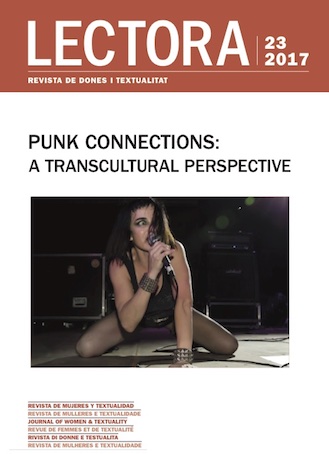Punk Pioneers: Chicana Alice Bag as a Case in Point
DOI:
https://doi.org/10.1344/Lectora2017.23.6Keywords:
Alice Bag, Chicano, punk, feminismAbstract
This study aims to present Chicana punk musician Alice Bag as one of the main female figures who exerted a great influence on the early punk scene of Los Angeles, California, and thus helped to pave the way for a wider influx of female musicians within punk and to put some feminist issues at the forefront. By doing so, we will try to broaden the social and cultural understanding of punk music. Both Bag’s autobiography Violence Girl, From East L.A. Rage to Hollywood Stage (2011) and her last LP, self-titled Alice Bag (2016), cover relevant issues related to Chicana women’s condition, thus turning punk into a powerful platform to articulate feminist and ethnic concepts.
References
Andrews, Katherine (2017), "Ranchera Music: A Mexican National Symbol", Panoramas: Scholarly Platform, 09/01/2017.
Bag, Alice (2011), Violence Girl. East L.A. Rage to Hollywood Stage. A Chicana Punk Story, Port Townsend, Feral House.
—(2014), "We Were There: Voices From L.A. Punk's First Wave", Razorcake, 79: n.p.
—(2016), Alice Bag, Don Giovanni Records.
Blush, Steven (2010), American Hardcore: A Tribal History, Port Townsend, Feral House.
Broyles-González, Yolanda (2006), "Ranchera Music(s) and the Legendary Lydia Mendoza: Performing Social Location and Relations", Angie ChabramDernersesian, The Chicana/o Cultural Studies Reader, New York, Routledge: 352-360.
Corrigan, Suzy (2007), "Art, Politics and How One Grrrl Joined the Feminist Timeline", Riot Grrrl. Revolution Girl Style Now!, Nadine Monem (ed.), London, Black Dog Publishing: 145-168.
Covarrubias, Teresa (2017), "Traigan el Punk del Oeste and Este de L.A. Parte 2", American Sabor, 12/05/2017.
Davila, Richard C. (2016), No hay Sólo un Idioma, No hay Sólo una Voz: A Revisionist History of Chicana/os and Latina/os in Punk, Electronic Thesis and Dissertation Repository, University of Western Ontario, Paper 3532.
De Fen (2011), "An Interview with Alice Bag: an Original LA Punk Rocker!", Punkglobe, 20/09/2016.
Ditto, Beth (2007), "Foreword", Riot Grrrl. Revolution Girl Style Now!, Nadine Modem (ed.), London, Black Dog Publishing: 8-9.
Habell-Pallán, Michelle (2012), "Death to Racism and Punk Revisionism: Alice Bag’s Vexing Voice and the Unspeakable Influence of Canción Ranchera on Hollywood Punk", Pop When the World Falls Apart: Music in the Shadow of Doubt, Eric Weisbard (ed.), Durham and London, Duke University Press: 247-270.
Johnson, Gaye Theresa (2013), Spaces of Conflict, Sounds of Solidarity: Music, Race, and Spatial Entitlement in Los Angeles, Berkeley and Los Angeles, University of California Press.
Lomelí, Francisco A. (1996), "Artes y letras chicanas en la actualidad: Más allá del barrio y las fronteras", Káñina, 20: 10-15.
McClary, Susan (2000), "Women and Music on the Verge of the New Millennium", Signs, 25(4): 1283-1286.
Moreland, Quinn (2016), "Alice Bag: Alice Bag", Pitchfork, 05/07/2016.
Ngô, Fiona I.B. and Elizabeth A. Stinson (2012), "Introduction: Threads and Omissions", Women & Performance: A Journal of Feminist Theory, 22(2-3): 165-171.
Nikpour, Golnar (2012), "White Riot: Another Failure…", Maximum Rocknroll, 17/01/2012.
Reddington, Helen (2012), The Lost Women of Rock Music. Female Musicians of the Punk Era, Sheffield, Equinox Publishing Ltd.
Tully, Gabriela (2016), "Alice Bag — 'He's So Sorry' Video", Stereogum, 07/06/2016.
Downloads
Published
How to Cite
Issue
Section
License
The Author retains ownership of the copyright in this article and grants Lectora: revista de dones i textualitat the rights to print publication of the Article. The work will be available under a Creative Commons Attribution-Noncommercial-No Derivative Works license, by which the article must be credited to the Author and the Journal be credited as first place of publication.
The Author is free to enter in seperate, additional contractual agreements for the non-exclusive distribution of the work as published in this journal (such as institutional repositories or a book), as long as the original publication in Lectora is credited.
The Author is encouraged to post the work online (eg in institutional or thematic repositories, or in their website), as it can lead to productive exchanges as well as to a greater citation of the published work (see The Effect of Open Access).





